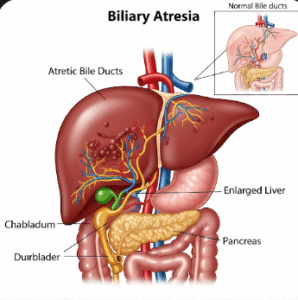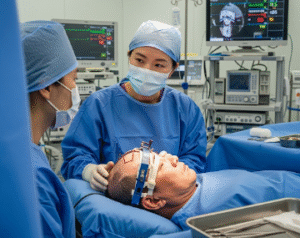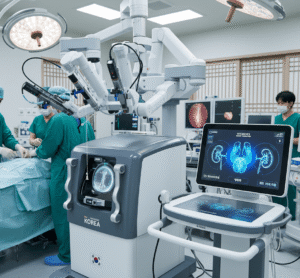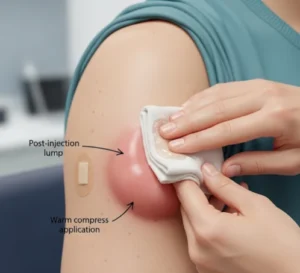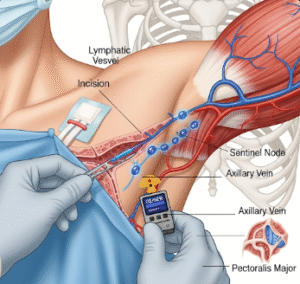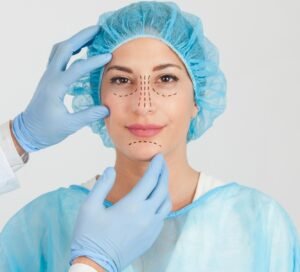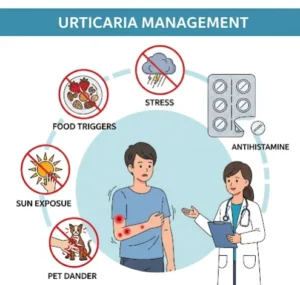Overview
Hyperreflexia is a medical condition characterized by overactive or overresponsive reflexes, often observed during neurological examinations. Reflexes, which are involuntary responses to stimuli, become exaggerated, and may indicate underlying nervous system disorders, particularly involving the upper motor neurons.
Hyperreflexia can occur in various age groups and may be temporary or chronic depending on the underlying cause. In South Korea, neurology and rehabilitation clinics provide advanced diagnostic evaluations and treatment options to manage hyperreflexia and its underlying conditions effectively.
Key Facts
🟢 ➤ Hyperreflexia involves exaggerated reflex responses, such as rapid muscle jerks or twitching.
🟢 ➤ Often linked to upper motor neuron lesions, spinal cord injury, or neurological disorders.
🟢 ➤ Symptoms may range from mild overactive reflexes to severe muscle spasms or stiffness.
🟢 ➤ Early identification helps prevent complications, improve mobility, and manage underlying causes.
🟢 ➤ Diagnostic evaluation includes neurological examination, imaging, and nerve conduction studies.
🟢 ➤ South Korean hospitals and clinics offer integrated care, including physical therapy, medication management, and interventional treatments.
What is Hyperreflexia?
Hyperreflexia is the enhancement of the normal reflex arc, causing muscles to contract more forcefully or rapidly in response to stimuli.
Key points:
➤ Reflexes such as the knee-jerk (patellar) or ankle-jerk (Achilles) reflexes are commonly tested.
➤ Hyperreflexia is often a sign of damage to the brain or spinal cord, particularly the upper motor neurons, which normally modulate reflex activity.
➤ It may occur symmetrically or asymmetrically, depending on the location of the lesion.
➤ Associated findings can include spasticity, clonus (repeated muscle contractions), and weakness.
Symptoms Related to Hyperreflexia
Symptoms can vary based on severity and underlying cause:
🟢 ➤ Exaggerated or brisk reflexes, easily observed during physical examination.
🟢 ➤ Muscle stiffness or spasticity, making movement difficult.
🟢 ➤ Clonus – repetitive, rhythmic muscle contractions following a stretch.
🟢 ➤ Weakness or impaired motor function if associated with neurological disorders.
🟢 ➤ Coordination problems, difficulty walking, or impaired balance.
🟢 ➤ Possible associated sensory changes such as numbness or tingling.
Causes / Possible Causes
Hyperreflexia occurs due to disruption or damage to neural pathways, particularly the upper motor neurons:
Neurological Disorders
➤ Stroke or transient ischemic attack (TIA).
➤ Multiple sclerosis, affecting brain and spinal cord signaling.
➤ Spinal cord injury or compression.
Metabolic and Systemic Causes
➤ Electrolyte imbalances (low calcium or magnesium).
➤ Severe infections affecting the central nervous system.
Drug-Induced Causes
➤ Certain medications, such as serotonergic drugs, may trigger reflex overactivity.
Other Causes
➤ Hyperthyroidism or excessive excitatory neurotransmitter activity can contribute to hyperreflexia.
➤ Congenital or hereditary neurological conditions may present with hyperreflexia from early age.
When Should I See a Doctor?
Seek medical evaluation if:
🟢 ➤ You notice unusually brisk reflexes, muscle stiffness, or clonus.
🟢 ➤ Reflex changes are accompanied by weakness, numbness, or loss of coordination.
🟢 ➤ Symptoms appear suddenly or progressively worsen.
🟢 ➤ There is a history of neurological disorders, trauma, or systemic illness.
Early evaluation allows timely diagnosis of neurological conditions, prevention of complications, and initiation of targeted therapy.
Care and Treatment
Management of hyperreflexia depends on treating the underlying cause and alleviating associated symptoms:
Medical Management
➤ Medications such as muscle relaxants (baclofen, tizanidine) to reduce spasticity.
➤ Anti-seizure or neuropathic medications if reflex overactivity causes pain or discomfort.
➤ Treating underlying neurological disorders (stroke, multiple sclerosis, or metabolic imbalances).
Physical Therapy and Rehabilitation
➤ Stretching and strengthening exercises to improve range of motion and muscle control.
➤ Occupational therapy for daily activity adaptation and mobility improvement.
➤ Neuromuscular training to reduce spasticity and prevent contractures.
Lifestyle and Home Strategies
➤ Maintaining regular physical activity to improve circulation and flexibility.
➤ Avoiding sudden jerky movements that may trigger exaggerated reflexes.
➤ Using assistive devices if balance or mobility is affected.
Advanced Care in Korea
➤ South Korean neurology and rehabilitation centers provide integrated care, combining medication, physiotherapy, and interventional procedures.
➤ Specialized programs focus on spasticity management, neurorehabilitation, and functional recovery.
➤ Patient education supports long-term monitoring and symptom management.
Highlights (Clean Green Arrow Version)
🟢 ➤ Hyperreflexia is characterized by overactive or exaggerated reflexes, often indicating upper motor neuron involvement.
🟢 ➤ Symptoms: brisk reflexes, clonus, spasticity, weakness, coordination issues, and impaired mobility.
🟢 ➤ Causes: stroke, multiple sclerosis, spinal cord injury, metabolic imbalances, medications, and hereditary neurological conditions.
🟢 ➤ Early evaluation is critical to diagnose underlying neurological disorders and prevent complications.
🟢 ➤ Treatment includes medications, physical therapy, occupational therapy, and rehabilitation interventions.
🟢 ➤ South Korea offers advanced neurology and rehabilitation services with multidisciplinary care and patient education.


